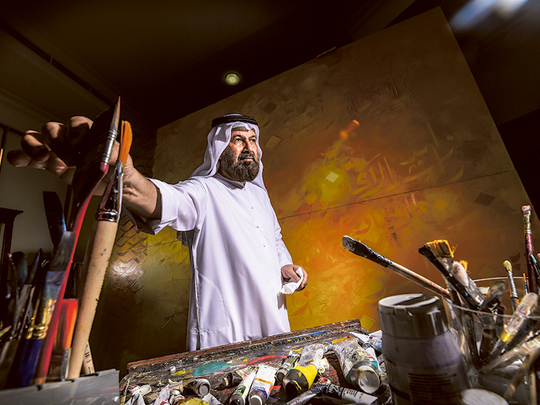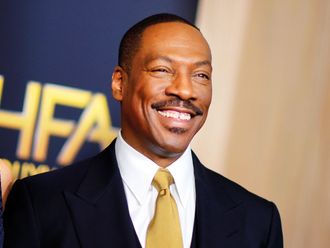
Abu Dhabi: The stunning transofrmation in the UAE’s art scene is probably best explained through the eyes of one of the UAE’s most treasured artists, Abdul Qader Al Rais. “In the 1970s, it was difficult to even buy art material. I think there was only one place in Dubai [that stocked a few colours and art supplies] but most of the material was not available,” Al Rais told Gulf News at his home studio in Dubai.
“Of course, there were no galleries or even art-related books [available],” he added.
Looking around his art studio, one of the two located in his home, which is packed with paintings and what seems like an endless supply of art material, it is hard to imagine the scene Al Rais describes of the old days.
Born in 1951, Al Rais is one of the first Emirati artists to emerge on the international art scene. He was only 17 when his first painting sold in 1968.
Drawn to art from childhood, Al Rais took every opportunity to express himself through art even if it meant drawing in sand with a stick.
His love for arts was nourished in a school in Kuwait.
Later on, the lack of opportunities in arts saw Al Rais give up what he loved most for around 12 years for a more “dependable job” at the then Ministry of Labour.
It was in the mid-80s that the self-taught artist returned to the art scene after much encouragement from his wife.
“At the beginning of the 1980s, there was only one gallery in Dubai,” said Al Rais. But slowly, the change was becoming visible.
Organisations such as Abu Dhabi Culture Foundation, he said, were established that worked hard to support artists. Then in the 1990s, there was the development of the Sharjah Art Museum which he said was instrumental for artists at the time.
Although the scene was changing, there were still challenges for artists, Al Rais said.
“You are working and you are not selling and it is difficult to show your work. Now, we have come a long way and are far ahead of other countries in the region.”
What kept Al Rais going was the continuous support from the country’s leaders.
“His Highness Shaikh Mohammad Bin Zayed Al Nahyan, Crown Prince of Abu Dhabi and Deputy Supreme Commander of the UAE Armed Forces, and his wife Shaikha Salama, they are one of the reasons that I continue to work. When I came back to arts (from over a 10-year break), I was doing exhibitions in Abu Dhabi and they were supporting me.
“His Highness Shaikh Mohammad Bin Rashid Al Maktoum, Vice-President and Prime Minister of the UAE and Ruler of Dubai, when he travelled abroad, he would present my paintings as gifts. This is something that really pushed my art around the world.
“Shaikh Abdullah Bin Zayed Al Nahyan (Minister of Foreign Affairs and International Cooperation) has one of the biggest collections of my art.
“Really, the leaders supported me and I can say that I maybe would not be here without their support,” he said.
He feels overwhelmed by the support the leaders of the UAE have extended to him through the years. Many a time, their simple enquiries such as ‘What are you working on?’ made him work harder, he said.
“After 2000, there was a real change, a change in everything, specially in my field,” Al Rais said.
By around 2005, there was a massive shift in the arts scene and suddenly big projects were being unveiled.
“When they started to create Saadiyat Island,” Al Rais says as he pauses, smiles and continues, “this is the biggest gift for all artists not just in the UAE but also in the Arab world and internationally.”
Events such as Abu Dhabi Art and Art Dubai, he said, have put the UAE at the forefront in the region.
Even people’s attitude about art has changed, he said. “{Earlier] a lot of people didn’t want their children to study arts because if they did well, maybe they would end up as an art teacher.”
Today, he is often approached for advice by parents whose children have a talent for the arts.
“There are big museums opening in Abu Dhabi and Dubai and I think by 2020, there will be [an even bigger] change in the art scene,” he said.
Al Rais is a firm believer that the unification of the UAE has helped foster the growing art scene in the country.
“When we are together, we are stronger and we can make a real difference. Everything has become better because of the unity.”
The UAE is lucky to have had leaders like Shaikh Zayed, the founding father of the UAE, and Shaikh Rashid Bin Saeed Al Maktoum. Their vision and hard work helped build a strong and great country for their people, Al Rais said.
“We hope to continue what they started.”











